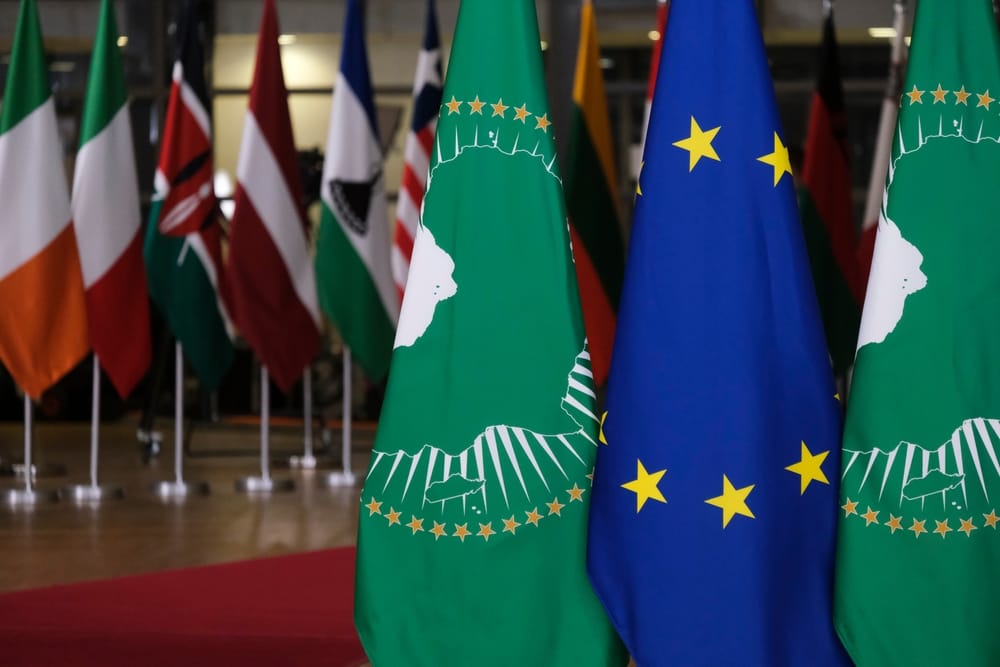By Bitange Ndemo, Ambassador of Kenya to the Kingdom of Belgium and the European Union and Sébastien Brack, Representative of the Kofi Annan Foundation to the European Union, and a Senior Advisor to African Political Outlook
Africa and Europe share a common past and, whether they like it or not, a common destiny. Yet as European and African leaders prepare to meet in Luanda for the 25th anniversary of the AU-EU partnership, the distance between the two continents feels broader than the sea that separates them.
Across Africa, there is a growing sense of disinterest. Brussels’ attention seems fixated on the wars in Ukraine and Gaza to the detriment of the tragedies unfolding in Sudan and the Democratic Republic of Congo. The EU is signing deals worth hundreds of billions of euros with the USA, while reducing its investments on the continent. It has gladly welcomed millions of Ukrainian refugees even as it tries to restrict access to African asylum seekers. However legitimate they may be, all these decisions create the impression that Africa is not a European priority.
And yet, in the long run, Africa and Europe remain bound by geography, history, and the undeniable truth that their futures are intertwined. The forces shaping our era – climate change, migration, digitalisation, and a shifting global balance of power – will test their relationship more than ever. But they also offer a rare opportunity to transform their relationship from one of donor and recipient to equal partners walking the same perilous road through a new multipolar world disorder.
“In this world of many centres, both Africa and Europe risk being sidelined if they do not work together.”
The old order is indeed giving way to something more complex and uncertain. No single power dominates; new ambitions from the Global South are expressing themselves, and the certainties of yesterday no longer hold. In this world of many centres, both Africa and Europe risk being sidelined if they do not work together. They are, in truth, mirror images of each other’s needs. Europe faces a demographic deficit, an ageing population, labour shortages, and slowing growth. Africa, by contrast, teems with youth, energy, and ambition. Europe holds capital, technology, and advanced infrastructure. Africa holds markets, raw materials, and an unstoppable creative pulse. Their futures are not parallel; they are complementary.
This interdependence finds expression in many forms, none more visible than the movement of people. Migration has too often been cast as a problem to be contained rather than an opportunity to be managed for mutual gain.
“Africa is no longer the continent waiting for technology to arrive. It is creating its own technology.”
Another force that could redefine the relationship between our continents is digitalisation. The digital revolution is not only transforming economies but also reshaping the meaning of power, ownership, and creativity. Africa is no longer the continent waiting for technology to arrive. It is creating its own technology: fintech in Lagos, digital governance in Kigali, agritech in Nairobi. Europe, for its part, has capital seeking innovation and investment opportunities, as well as experience in regulation, research, and ethical data governance. Together, they have the potential to form a digital alliance that benefits everyone.
Such cooperation could redefine not just economies, but the moral foundations of technology itself. For too long, Africa has been treated as a data mine and Europe as a gatekeeper. The future demands a different vision: Africa as a digital powerhouse, Europe as a gateway of collaboration and shared purpose.
The upcoming Europe–Africa Summit in Angola offers both continents an excellent opportunity to make headway on this new paradigm. It must not become another ritual of empty promises and photo opportunities; it must be a turning point. A moment to commit to deepening partnerships on the three fronts that matter most for a just and sustainable future.
First, shoring up multilateralism.
In a world sliding towards rivalry and fragmentation, neither Africa nor Europe has any interest in a return to the zero-sum games of great power competition. They both stand to gain from a rules-based order where dialogue, not domination, shapes global governance. Together, they can be a stabilising force, reforming multilateral institutions to give voice to the Global South, defending international law, and protecting shared norms from the corrosion of nationalism and power politics.
Second, strengthening regional economic integration, beginning with the African Continental Free Trade Area (AfCFTA).
A unified African market offers Europe a historic opportunity, not as an extractive frontier, but as a dynamic partner in co-production, green manufacturing, and sustainable trade. Supporting AfCFTA’s success means empowering African businesses to compete globally and ensuring that European investment nurtures local value chains rather than perpetuating dependency.
Third, accelerating climate adaptation.
Africa bears the harshest effects of a crisis it did not create, while Europe faces its own ecological reckoning. The solution lies in cooperation in co-developing green technologies, renewable energy systems, and nature-based solutions that safeguard livelihoods on both continents. Climate adaptation is not merely an environmental issue; it is an act of moral responsibility and mutual survival.
These pillars form the foundation of a partnership that looks forward rather than backward. But they must be infused with humanity: with digital solidarity, youth empowerment, and fair mobility as the living veins of cooperation.
We write these words as an African and a European, not from a place of blame, but of conviction. We see the fractures widening, but we also see the bridges waiting to be built. Africa seeks fairness, justice and opportunity, not charity. Europe aims for partnership and renewal, not dominance. Both seek relevance, security, and equity in a world of growing uncertainty.
History has already shown us what divides us. The future, if we are wise enough to claim it, can show us what unites us.
Main photo: Flags of the African Union and the European Union stand in the European Council in Brussels, Belgium, on February 18, 2022. Copyright: Alexandros Michailidis / Shutterstock


